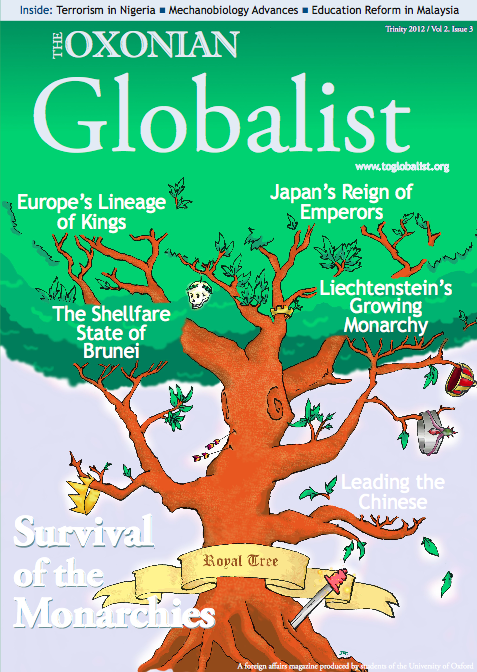
The Gulf Monarchies have formed a supra-national organization, the Gulf Cooperation Council. Photo by SpLoT at en.wikipedia.
The Arab Spring uprisings have triggered notable shifts throughout republican Arab states, and deposed autocratic presidents in Tunisia, Egypt, Libya, and Yemen. The story in the Gulf monarchies, however, is starkly different. Protests in Bahrain have been violently quashed. Oil-rich regimes in Kuwait, Oman, and Saudi Arabia have used government hand-outs to pacify their citizens. Overall, Gulf monarchies have opted to use their wealth as a means to ward off democratising reforms. While this may preserve the status quo for a while longer, it will harm the Gulf monarchies’ relations with Western allies and regional neighbours, particularly in revolutionary states like Tunisia and Libya.
The Gulf Monarchies – Saudi Arabia, Oman, Kuwait, the United Arab Emirates, Bahrain, and Qatar – are, for the most part, autocratic, hydrocarbon-rich states whose regimes derive legitimacy from tradition and an inflated ability to pacify populations through the distribution of petrol dollars. It was initially postulated that Gulf monarchies would be able to weather the Arab Spring by simply using oil wealth to stave off reforms. Brutal suppression in Bahrain and escalated calls for reform within Saudi Arabia itself have cast doubt on that assumption.

The Pearl Roundabout in Manama demolished by Bahrain’s Sunni monarchy. Photo by Mustapha Hamoui via beirutspring.com.
In March 2011, barely one month after protests had begun in Bahrain’s capital, Manama, the Sunni monarchy invited Saudi troops to help suppress their restive Shiite population. Quickly ascertaining that a successful rebellion would likely incite its own Shiite population to action, Saudi Arabia swiftly deployed its military to quell the Shiite protests. Manama’s Pearl Roundabout, previously the hub of protest activities, was destroyed that same month, and numerous protesters were killed. Despite the brutality, Bahraini Shiites and pro-democracy groups have continued the protests, clashing with police throughout the spring and summer months of 2012.
Proposing Change
Likewise in Saudi Arabia itself, calls for reform have escalated. A 65-year old man self-immolated in protest on January 21st 2011 and Faisal Ahmed Abul-Ahad, a protest coordinator on Facebook, was allegedly murdered by Saudi security forces before his planned “Day of Rage” protest could take place in March 2011. Many Saudis were also appalled at the role their forces took in suppressing the Bahraini uprising. Protests for labour rights and women’s rights have continued until now in the Kingdom. In April, Saudi Princess Basma bint Saud bin Abdulaziz created a firestorm by publishing an article, What I’d Change About My Country, which proposed reforms of Saudi Arabia’s constitution, social services, and chaperone laws.
By muting and suppressing these acts of protest, the Saudi regime may be dooming itself to a generation of increasing irrelevance when it comes to matters of civic leadership and ideological reform in the Arab world. Like other Gulf states, Saudi Arabia remains autocratic and unsympathetic to democratising reforms in the region. Libya, Egypt, and especially Tunisia, remain more morally inspiring to Arab pro-democracy activists than any of the Gulf states. Despite offering minor concessions, monarchies in Oman, Saudi Arabia, and Kuwait are widely perceived throughout the region as backward-looking regimes that suffocate free speech.
This perception will prove increasingly problematic for the Gulf monarchies as their political and strategic positioning in the region becomes less secure. With Turkey emerging as an economic heavyweight with great sway in the Levant, Mesopotamia, and North Africa, the Gulf monarchies are likely to find themselves ever more isolated.
A Relationship Strained
The relationship that the Gulf monarchies have with the West will also come under increasing scrutiny in future years as energy diversification and oil discoveries in other parts of the world mean developed nations will no longer have to depend so heavily on petroleum exports from the Gulf states. Even now, the largest proven oil reserves are no longer held by Saudi Arabia but by Venezuela, a nation that is friendlier with most of the BRIC powers. The episode in Bahrain also revealed the increasing cost of maintaining close relationships with the Gulf monarchies. While no doubt a pragmatic ploy to maintain a stable port for its 5th Fleet, which is based in Bahrain, the United States’ silence in the wake of last year’s brutal suppression in Bahrain cast doubts on its democratic credibility during the Arab Spring.
If the transitioning Arab republics manage their governments and economies in a productive manner, they may be able to isolate the Gulf monarchies using their influence as the main movers and shakers in the region. Already Qatar and Saudi Arabia are mounting large diplomatic offensives in Syria and elsewhere in order to maintain their relevance, protect their interests, and attempt to recover their station as leading Arab states.
However, if the Gulf monarchies fail to reform, they may find themselves being marginalised in a part of the world whose evolution has rendered them redundant. Although the Arab Spring may not have led to the creation of secular liberal democracies in all North African states, it might have signalled the beginning of the end of the powerful petrol monarchies in the Gulf.



